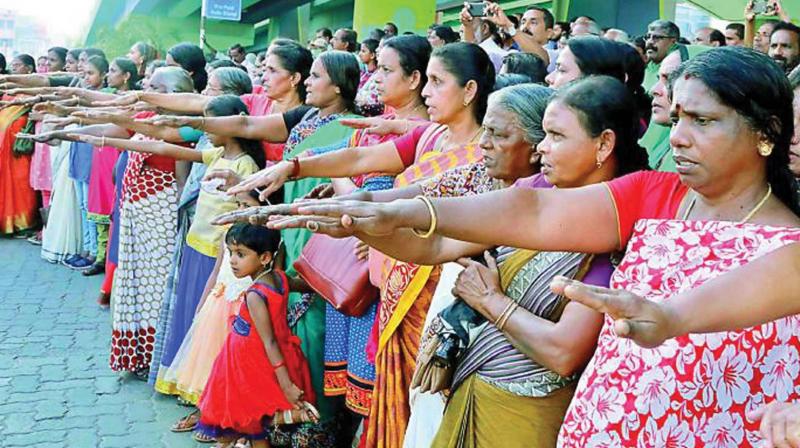Time to break Gender walls
The real test of a society\'s intention of serious inclusion is proved in its readiness to accord her space in places where it matters.

The state, which famously hosted a 620 km-long women’s wall from Kasaragod to Thiruvanantha puram as part ofa government-sponsored initiative to uphold gender equality,interestingly, has dismaying figures of women’s representation in the Lok Sabha.
It's yet another election season. With awaken political consciousness, exciting social media campaigns and discourses happening in every nook and corner, people are prepping up for the electoral battle, to choose their 20 leaders who would represent them at the Lok Sabha. However, in the state known for its high standard of living, educational, healthcare facilities, social consciousness, literacy rate and huge progressive movements, dismaying figures of gender representation take the sheen out of the whole process.
In its over six decades of existence, Kerala, the Indian state where has the rare distinction of women outnumbering men, have seen just 12 women making it to the Lok Sabha. They include Annie Mascarene (1st LS), Suseela Gopalan (4th , 7th, 10th LS), Bhargavi Thankappan (5th LS), Savithri Lakshmanan (9th, 10th LS), A.K. Premajam (12th, 13th LS), P. Satheedevi (14th LS), C.S. Sujatha (14th LS) and P.K. Sreemathy (16th LS). Nor has the state seen a woman Chief Minister so far. Why are women under-represented in Kerala politics, especially when it comes to elections? Though the state has seen the rise of several women's movements and the revolutionary Kudumbashree Mission activities, which offer the women financial independence, gender disparity in elections sticks out like a sore thumb.
"This is not something new. Gender disparity exists in politics, as in almost every spheres of our society," observes Dr T.N. Seema, former Rajya Sabha MP. "When we look into our political history, we cannot see a steady growth in women's participation. It is definitely a flaw. Now, women are seen in local self governing bodies just because of the mandatory reservation. If that is not there, it would still be a male-dominated domain," she says.
The grossly skewed ratio of representation is a national trend, says Shaarika Menon, an activist. "India, which beats its chest about worshiping women, relegate them to the background when it comes to core decisions. It has been for long a male dominated society and its manifestations have spilled over to every area of social life. The most blaring and jarring of them all is visible in the political representations," she feels.
According to a study at the United Nation University, evidence showed that assembly constituencies with women representatives significantly showed higher economic growth than their male counterparts. The trend of discrimination also seems to reflect on political decision while allotting seats. "Even in a purportedly progressive state like Kerala we do not see much participation of women. Unless there is no other choice, a seat is always considered for a male candidate. In the wake of proclamations of 'new Kerala', equality seem sidelined and made an issue only when a political point has to be scored. Building a woman wall somehow does not represent the she population.
Her inclusiveness will be of value only when she is allowed and given a chance at making changes. Otherwise uplifting and creating representations for women will just remain as party howling over microphones and nothing more," Shaarika adds.
Seema opines that women should be allowed to contest in seats that guarantee victory. And, she does not feel that women would be unwilling to come forward. "You cannot learn administration from theories; you have to learn it by doing it. Give women a chance, they will prove their mettle. Kerala is a place where a scope for change still exists. We have to create possibilities for that change. Also, women should demand for their rights," she stresses.
Unless and until women participate in policy changes, including their well-being as part of political and social agenda, will always remain a sham. It's time, changes happen for good.

